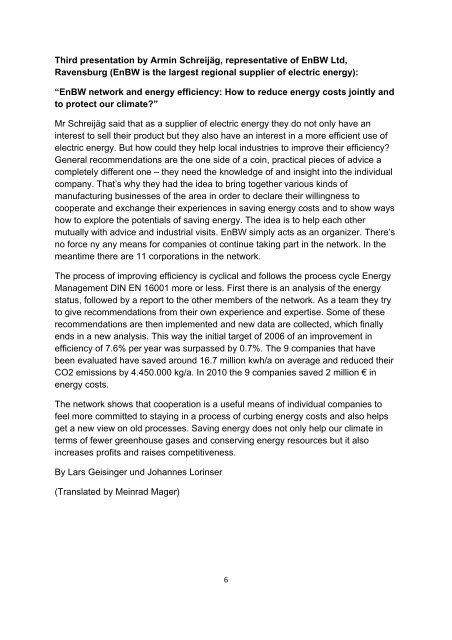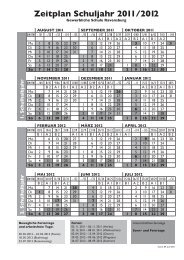Section 2 i) Initial Research Work - Gewerbliche Schule Ravensburg
Section 2 i) Initial Research Work - Gewerbliche Schule Ravensburg
Section 2 i) Initial Research Work - Gewerbliche Schule Ravensburg
- No tags were found...
You also want an ePaper? Increase the reach of your titles
YUMPU automatically turns print PDFs into web optimized ePapers that Google loves.
Third presentation by Armin Schreijäg, representative of EnBW Ltd,<strong>Ravensburg</strong> (EnBW is the largest regional supplier of electric energy):“EnBW network and energy efficiency: How to reduce energy costs jointly andto protect our climate?”Mr Schreijäg said that as a supplier of electric energy they do not only have aninterest to sell their product but they also have an interest in a more efficient use ofelectric energy. But how could they help local industries to improve their efficiency?General recommendations are the one side of a coin, practical pieces of advice acompletely different one – they need the knowledge of and insight into the individualcompany. That’s why they had the idea to bring together various kinds ofmanufacturing businesses of the area in order to declare their willingness tocooperate and exchange their experiences in saving energy costs and to show wayshow to explore the potentials of saving energy. The idea is to help each othermutually with advice and industrial visits. EnBW simply acts as an organizer. There’sno force ny any means for companies ot continue taking part in the network. In themeantime there are 11 corporations in the network.The process of improving efficiency is cyclical and follows the process cycle EnergyManagement DIN EN 16001 more or less. First there is an analysis of the energystatus, followed by a report to the other members of the network. As a team they tryto give recommendations from their own experience and expertise. Some of theserecommendations are then implemented and new data are collected, which finallyends in a new analysis. This way the initial target of 2006 of an improvement inefficiency of 7.6% per year was surpassed by 0.7%. The 9 companies that havebeen evaluated have saved around 16.7 million kwh/a on average and reduced theirCO2 emissions by 4.450.000 kg/a. In 2010 the 9 companies saved 2 million € inenergy costs.The network shows that cooperation is a useful means of individual companies tofeel more committed to staying in a process of curbing energy costs and also helpsget a new view on old processes. Saving energy does not only help our climate interms of fewer greenhouse gases and conserving energy resources but it alsoincreases profits and raises competitiveness.By Lars Geisinger und Johannes Lorinser(Translated by Meinrad Mager)6
















